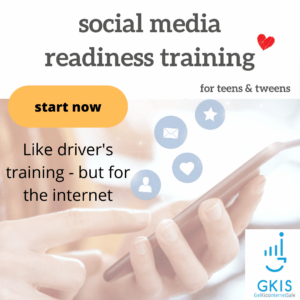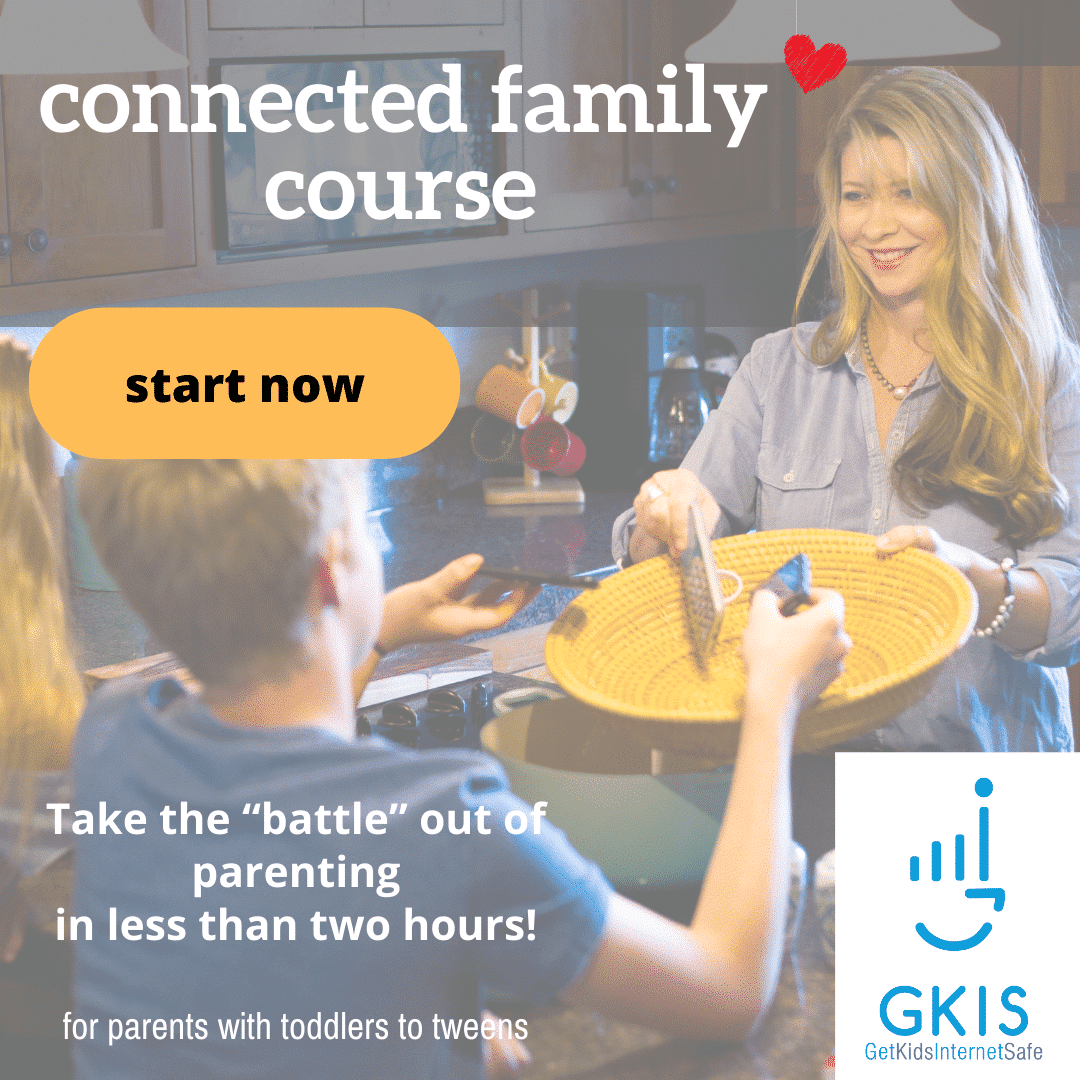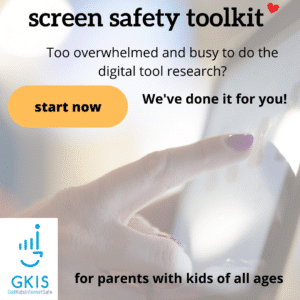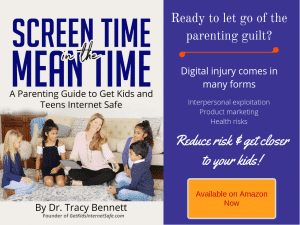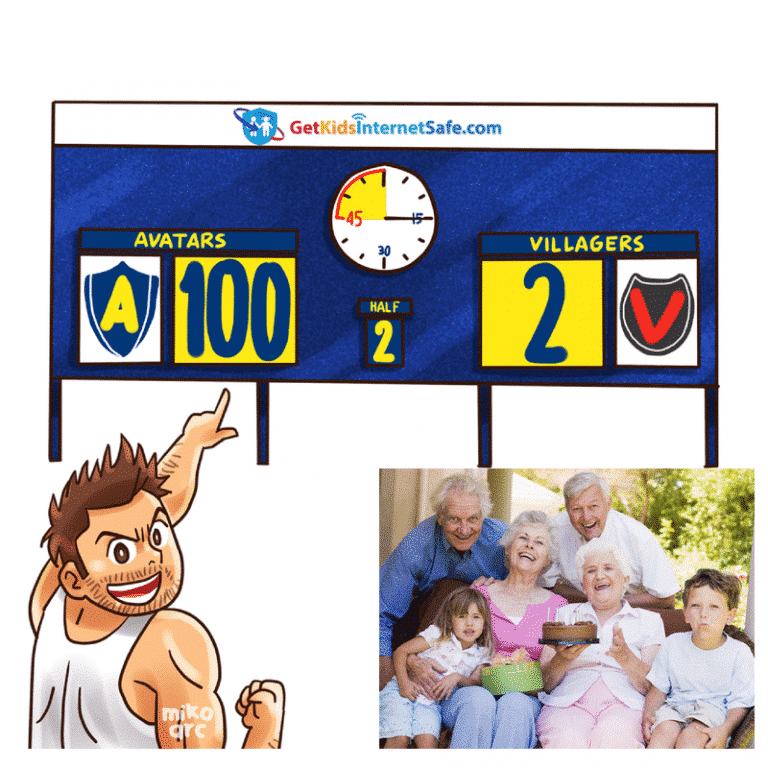
Good parenting can be overwhelming, and we need all the support we can get to do it well. Being pulled in all directions while trying to provide the safest home for our children is leading to problems like isolation and the overuse of screen media. It’s time to address the problems and build a better village. Less screen time, more active parenting, praise, and validation and facilitation are critical! I’ll show you how to get that done in this week’s GetKidsInternetSafe (GKIS) article.
Reflective Listening & Validation
Corbyn* is my ten-year-old son. Yesterday he woke up on a frantic mission to get a Play Station game he wanted. First thing in the morning he hopped out of bed, gathered up his wrinkled dollars and scattered quarters, and counted out $19. Thinking he had $36 saved, he was bitterly disappointed. So naturally, he turned to Sidney*, his 12-year-old sister and BFF, and accused her of stealing $17. Then, still frantic, he turned to the next nearest lightning rods, Mom and Dad, and accused us of not following through when we owe him chore money. He wasn’t attacking in a deliberate, organized way, but rather with a more pained and desperate tone.
I heard of this drama first when Sidney marched into the bathroom while I was putting on my makeup and staged an impressive protest dripping with indignation. When I told her to bring in the offender for a discussion, she sheepishly said, “No, Dad handled it.” (We really get on them for splitting between us when there’s an issue.)
Next, my husband arrived with Corbyn in a body lock trying to tickle the offender into submission. From the tears threatening in my son’s eyes, my heart knew this was not going to do the trick. I understand my son like a lime knows a lemon; we speak the same emotional language. So I broke the offender from his hug prison and attempted good parenting; validation and facilitation of problem-solving.
I know, stop with the shrink talk already. Essentially this means I let Corbyn know that I saw his feelings and heard his plea, then encouraged him to seek a better strategy than attacking his support system one by one. Although tempted, I didn’t yell and threaten, shame, or abandon him to his frenzy. I let my heart do the talking. And it worked.
It went something like this: “Corbyn, I hear you really want that PlayStation Game, and you are disappointed you only have $19. Attacking your best friend and us, your best supporters probably isn’t your best strategy. Maybe you should apologize and ask us for help instead.” Of course, this initially made him more emotional because he let down his guard. But it also gave him the hope and support he needed. Within a few minutes, Corbyn had the plan to collect his birthday money, pick up dog poop, and collect the cash he needed to get his prize. Crisis averted, everybody was happy, and my husband complimented me for being awesome. Most importantly, Corbyn learned an important lesson in problem-solving: chill out, seek your village, and get it done!
My parenting strategy in this instance isn’t groundbreaking, nor am I the perfect parent. But psychology research has demonstrated that validation and facilitation raise emotionally healthy kids. And the lack of it may lead to significant emotional issues.
In today’s frenzied digital age with parents working more hours than ever and distractions at every turn, we aren’t doing enough good parenting. When I was little, kids were set loose in the neighborhood until a porch light came on. There’s a useful debate to be had about if this was better for children or not. But that aside, what we are inarguably failing at is providing the “It takes a village” sentiment.
Our generation is so afraid of child predators that we have swaddled our children at home. They get bored and drift in front of screens for too many hours; ironically connecting to the very portal that child predators have expertly learned to exploit. YouTube, video games, social media, and the Internet cannot provide the critical parenting skills our kids need to thrive. Keeping them home with unlimited use of technology is neither protection nor providing parental guidance.
I embedded Margaret Heffernen’s brilliant TED talk “Dare to Disagree” at the end of this blog. Her inspiring message is that openly addressing conflict is critical to learning. That we must create an environment for our children that encourages open information, active problem-solving skills, and the moral courage to tackle challenges. That means being too permissive with our kids, or alternatively shutting them down because it takes too much time to parent will leave them vulnerable, without the affection and guidance they need.
As a clinician, I fully agree with Ms. Heffernen. Throughout my career, I have repeatedly seen that a common factor among my most distressed patients is an attachment disruption; a parent who, for a multitude of reasons, wasn’t present for the child. And among those without a strong parenting presence, those that were gifted an attachment from an extended family member, a coach, a teacher, or somebody in the village who cared about them and spent time were saved.
When I was a teenager my father would bait me into fierce debates by saying something mildly offensive. By the end of the discussion, he would skillfully slide into a moderate position on which we could both agree. It wasn’t until I was much older that I recognized he was coaching his sensitive, anxious daughter to confidently defend a position, a skill critical to my happiness and success. And, in an entirely different way, my mother served as a role model for developing important life skills like grit, ambition, and assertiveness. I didn’t get to spend a ton of time with my hard-working parents, but these quality moments were crucial to my development. And beyond my immediate family, I can identify many adults who provided meaningful guidance along the way.
Here are today’s GetKidsInternetSafe TIPS:
-
Spend time and listen:
-
Validate your child’s emotion (“I can see you’re feeling sad”)
-
Identify the problem (“What happened?” “What needs to be solved?”)
-
Facilitate problem-solving (“What’s your goal?” “What steps can get you to your goal?”)
-
Praise (“I love how you talked that through” “You really know how get things done!” “I love how you speak from your heart”)
-
-
Get your kids involved in activities and with other trusted adults who happily support them.
-
Limit screen media time.
I love the enthusiasm of GetKidsInternetSafe subscribers and can feel the GKIS Revolution building. Thanks for being courageous by facing these issues and taking the extra steps to be more awesome and, rather than pointing fingers at each other, coming together in a commitment to our best parenting. Ironically, the Internet is helping us find our village. Now go out and build it for the kids directly in your community! And don’t forget to forward this article to those who may share your passion.
I’m the mom psychologist who will help you GetKidsInternetSafe.
Onward to More Awesome Parenting,
Tracy S. Bennett, Ph.D.
Mom, Clinical Psychologist, CSUCI Adjunct Faculty
GetKidsInternetSafe.com
*name changed to protect child privacy
Photo Credit
Child of the pure, unclouded brow by Nick Kenrick, CC by-NC-SA 2.0
Don't worry, we will never spam you.




